- Home
- Madeleine Roux
Tomb of Ancients Page 20
Tomb of Ancients Read online
Page 20
But still, when those days arrived, I might spend all my ungoverned hours hiding up a tree with a book, and then throwing rocks at squirrels with my one friend, Jenny. Her family never visited or invited her home, either, her father gambling away their money, her mother ever abed with some real or invented frailness.
And so, desperate for those easier days, but knowing they were far off, I tiptoed past the sleeping teachers at the door that night, over the threadbare carpets, down one set of stairs, and across the left side of the second-floor gallery to the library. Nobody thought to guard the library, since the dozing sentries outside the bunk room were considered vigilance enough. The wood floors of the library were icy cold on my bare feet. Francine Musgrove, the person, at the time, whom I considered the worst person in England, had stolen my socks and hidden them in a chamber pot. Nothing, not even warmth, was worth the price of fishing around in someone’s piss bucket.
The books, however—the lovely, lovely books—and the quiet banished the misery of the cold. I found a nook near the window and read by moonlight, rousing myself with pinches so as not to be caught sleeping there come morning.
Now I stood once again in a darkened library, and I felt strangely similar—cold, alone, delinquent, choosing to put myself in a place where I did not belong.
God, I thought, blinded for a moment as all the light in the Tomb of Ancients went out, what would Jenny think of me now? My greatest adversary was no longer Francine Musgrove and her penchant for thieving my undergarments; my adversaries were gods, creatures of ancient myth, vengeful spirits, and the unquestionably evil thing descending from the ceiling now. I shivered, realizing that it had been hovering in the darkness all along, watching us. Waiting.
Even Francine Musgrove did not deserve to be faced with this.
Instinctively, I reached for Mother’s hand. She watched the Binder drift down toward us with narrowed eyes. The fine, purple hairs on her arms stood on end, and she whispered something, a prayer, in a language far older than English. The true language of the Dark Fae.
This Binder looked nothing like the last. Indeed, it was hard to consider it one thing at all, for it was primarily a collection of arms, each dangling from the end of a glistening string. I did not need to step closer to know those strings were living, more like tendons than twine. The hands at the ends of those arms, perhaps thirty in all, held quills and inkpots, blotters and pouches of sand, wax, brands, and various jars filled with colored liquids, most too thick to be ink. One hand juggled a pair of dice, one cube red and the other black, each side mottled and carved with odd symbols.
And at the center of this pale and fleshy array hung an overlarge head, attached to a withering white torso. The Binder had no legs, and it appeared sexless; it was bulbous and smooth, the color and quality of an egg. Its odd, round body, floating amid the detached arms, gave it the vague appearance of an insect with many legs, yet it defied even that comparison, for its “body” was at least the size of a wagon.
The only resemblance it bore to the other Binder was its slit-like nostrils and unsteady mouth, which flapped and jostled as it floated there above us.
“This one carries two of my creations.” Its voice reminded me of a workman who drank in the alley outside my childhood home. Buoyant, nasal, jolly. But then, he had gone on to stab his wife in a drunken rage, so maybe not so jolly after all.
“The white book,” I said, dredging up my voice from a chest fluttering with fear. “I . . . I would see it destroyed.” I removed the pack from my shoulders and dropped it. Malatriss swooped out of the darkness and took it up, then carried it closer to the Binder.
The Binder’s face careened toward mine, so close it shocked the breath out of me. I gasped and closed my eyes, then forced myself to open them slowly. Its loose mouth chewed, passing spittle from cheek to cheek, as it studied me from an inch away.
“A mark upon this one’s hand. The mark of a Binder,” it whispered.
“Yes. I—I met one of the Eight before, the one that binds souls.”
“Then this one has met Six. I am Seven.” It gradually eased away from me, and one of its arms dropped down on its sinew to fish the white book out of the bag. Then it looked back at me. “And what of the book inside this one? What is to be done?”
Wringing my hands, I looked up at Mother, who nodded gently. “You carry it, Louisa, it is yours to do with as you please. I would not be myself if I imposed my will.”
“But it’s part of you, too,” I said. “It’s the only reason they gave me Father’s soul, to keep the book of the Dark Fae from being lost.” Seven had grabbed the white book and begun flipping through it, one disembodied hand holding the spine while another floated down to flick the pages. I cleared my throat. “Malatriss said I should choose my requests carefully. So I am. I only want the white book to be destroyed, and then we should like very much to leave.”
Seven laughed at that, again reminding me of a drunk. It swayed as it laughed, bumping into several of its arms. “To leave. Yes, good. To leave. Then this one will have what she asks, but only after I receive my due.”
Two boons. I had no doubt the cost would be steep, and I braced to hear it, thinking of the pile of crumbling bones in the corner.
“Balance or chaos, balance or chaos?” The Binder’s pale hand holding the dice began to shake them, and I gulped, but I had no idea which outcome to hope for. All of its other arms went still as the hand threw the dice, the two little squares landing directly in front of me, held aloft by some unseen force. They both landed to display tiny scale symbols. Balance.
“The white book is unwritten.” The hand paging through the book glided away, another, holding a black quill, took its place and began tracing over the words. As each illegible letter was written over, it vanished from the parchment. “Story becomes memory. Memory becomes rumor. Rumor becomes legend. Legend fades.”
It hurt, unexpectedly, to watch the book being undone. With each disappearing word, I thought of an Upworlder going with it. Their lives, their very essence, erased from the world. And I thought of Dalton, whom I had come to admire, and the sad longing in his voice when he’d insisted I destroy the book. “There will be no one left to blame when I’m gone.” Perhaps that wasn’t true. Perhaps there would be someone quite obvious to blame. Me.
Or Mr. Morningside, as it was at his request that I had come. My heart filled with regret and my eyes with tears. The choice could not be unmade, but I wondered if I might have been strong enough to live with Father’s influence, to run far, far away, up a mountain, to the depths of a desert, and find some way to quiet his voice. Now I would be left trusting the Devil in the world to remove the Devil inside, and all of his mistakes and his lies told me I had erred when I chose sides.
I peered into the darkness. Somewhere, an empty case waited, and soon it would hold the shepherd. Would another soon hold Father? Father, who was uncharacteristically passive while the white book was wiped clean. Perhaps, finally, I had done something to win his approval.
Seven closed its round black eyes, quiet and thoughtful, mouth slack as the Binder swayed back and forth. I glanced at Malatriss after minutes of this strange silence. Had the Binder . . . Had it gone to sleep?
“What happens now?” I asked, clearing my throat.
“The unbinding will take time, and the Binder must choose your sacrifices.”
Sacrifices. We had traveled the windy road from boon to favor to sacrifice. Not that I was unduly surprised—a wrong answer to a riddle lost a finger. This was not a place of light conversation and idle threats.
“Sacrifices?” Mother asked. She apparently shared my unease.
Malatriss moved across the single pool of light remaining in the tomb, reaching out to touch my cheek. I recoiled and she chuckled.
“What do you think the Binder uses to make the books? Air and wishes? Nochtli the Thorned provided the leather for your book, though it may now reside in living flesh.” Malatriss took great pleasure in my horrifi
ed look, that much was obvious. Her chuckle drew out into a laugh, and she regarded her pet snake with a tilt of her head, chucking the thing under its head. “She found the gate at the mouth of three rivers and brought her pretty bird inside. Willing, wise, she tasted death in disease, but a shaman cured her before she went to the true night. Nochtli brought her pretty bird inside the tomb, and when the Binder commanded she kill it, she refused.”
“Barbaric,” I whispered. “Why the bird? What could it possibly have done?”
The Binder continued its work and its contemplation.
Malatriss glanced up from the snake, sneering. “It was a truly awful bird. I could tell it didn’t like Nira.”
I stoppered the ugly things I wanted to say about that—if the doorkeeper could look into a heart and divine its willingness, perhaps she could also sense my dislike for her pet.
The Binder worked faster now, pages flying, the words disappearing so quickly the quill seemed only a blur. We waited for Seven to make its decision, and each passing moment filled me with greater anxiety. My palms were slick with sweat. I could hardly bear to stand still, knowing some impossible pronouncement was soon to be made. I scrubbed my face with both hands and sighed, wanting the whole ordeal to be over at last, wanting to at least know what I must do to escape the Tomb of Ancients.
“All of this over a silly book,” I said.
Malatriss jerked her head up at that, scowling. “The Binders make the world, the Binders make the books, the books make the gods.”
“Would that not make the Binders the gods?” I murmured. Mother brushed my hand. She was right, I was pressing this creature too hard and being foolish in my frustration and impatience.
“No, it makes them Binders, and it makes you all but insignificant.”
Seven woke up. Its fathomless black eyes gazed down at us, glassy and momentarily unseeing. Then it seemed to find us, see us, and I took Mother’s hand once more. She leaned her head toward mine, her soft pink hair touching my shoulder.
“Do not forget,” she told me. “Courage.”
The Binder’s voice boomed through the hall, echoing into the endless shadows around us. The mark on my hand burned and burned. Willing. But was I? I stared into the more-than-a-god’s eyes and hoped that it knew what I wanted. Mercy, and the chance to see my friends outside the tomb once more. Had I not done enough? But then, could a thing like the creature before me care?
“This one’s book will be bound again,” Seven proclaimed, nodding toward me. “I will claim this rebound book of the Dark Fae, Daughter of Trees, and remake it with your very essence.”
Chapter Twenty-Six
Father did not like that at all. For his spirit knew, just as I did, just as Mother did, that to remove him was to remove the one thing keeping me alive. Then something shifted, and with it, my understanding, too. Father was no longer angry but excited. Elated. This ritual would take him from me, and without my body to hold him, give him the chance to be completely free. Resurrected. Whoever won, I lost. The Binder had handed down a death sentence, and for a long, painful moment I could not breathe.
Inside my mind, Father smiled. Then the screaming began.
My screams. The first time Father overpowered my will, it had been a gradual thing, the slow creep of a negative thought twisted into something more dangerous. A thorn that became a barb that became a knife. The drip, drip, drip of confusion, of not knowing whether a thought was mine or his. First, I stopped taking my tea with cream and sugar, until I began preferring a strong herbal brew that could only be found at one shop in the neighborhood. Then each tree began to have its own unique and alluring perfume, and insects, if I skewered them with a look, would retreat, leaving me in peace.
And that was when it was all still manageable. When it felt not like being captive but like putting up with an odd relative come to stay.
Needless to say, it had gotten worse.
A single thought survived the heat now exploding through my skull: I had done the right thing, for whatever I could do to rip this monster from my mind was, indeed, what must be done.
I felt my knees collide with the ground, and somewhere, in the distance, a cry from Mother. What a response to the Binder’s demands, though this was not my own. Father had waited, letting me grow comfortable, letting me lower my guard. And now he’d struck, with all his pent-up rage, not just red before my eyes but bright crimson-and-black spangles, and a steady sound like the drums of war pounding in my head, louder and louder, until I felt sure my eyes would pop and my teeth would slice through my tongue.
Here it came, his wrath. I had worn a pin once, gifted to me by Mr. Morningside. “I am Wrath,” it said. But I had never been this, never been the last desperate attempt at living by a god cornered into death. Was this what Khent and Dalton faced back outside the door? Did the shepherd sense his time was close and find terrible power and pain in his imminent end?
Every word of the book inside of me was whispered by the Binder at once, and though my eyes were no longer my own, I felt the searing in my fingers as they elongated into claws, felt the tightness in my skin, my legs, my arms, my spine, as the twisted deer of Father’s nightmares surged through me. Even Malatriss shouted something obscene and afraid, in a language that was lost, in the tongue I had used in the stranger’s ritual at Cadwallader’s and that was now branded into my palm.
“Do not whisper your elder speak before me, doorkeeper. The gods may sleep in your tomb, but you have never woken one to challenge it.”
Father’s voice through my lips. He spread outward like smoke, and Mother’s warm hands fell on my arm, but Father threw her off, into the darkness. I cried out but was instantly silenced. He had pushed me to the bottom of the sea, and though I sensed a light high above me, no amount of thrashing and kicking brought me near the surface. I drowned in his black-blooded fury and tasted the sourness of revenge on my tongue. It was all he craved, blood and revenge, his spirit impervious to Mother’s pleas for understanding. For patience.
“You would rip me from this fleshling, and once I would have welcomed it,” he roared, and his arm—mine—swiped with razor claws toward Malatriss. He was going to get us all killed. “She has proven herself somewhat useful, but I can take many forms. You may unmake the white book, but you will never unmake me. I am the Dark Father of the Trees, Caller of Night, the Stag in the Sky, and I will carry the book within me from this place, and I will not be stopped.”
Mother no longer pleaded with him, but with Malatriss. How long would they put up with this insubordination? Father had to be mad to think he could overpower those that had created him in the first place. I had read Dalton’s diary, which meant he’d read it, too. Only a madman would take such warnings, such violence, lightly. But yes, of course. Of course he was utterly, irredeemably mad.
“I see now.” The Binder spoke, unperturbed. Intrigued. “This one is not one, but two. This, too, like all things, can be undone.”
Father roared, undeterred, and lashed out against Malatriss. She hissed, as did her snake, the white serpent striking fast, batted away with a swift riposte from Father, and then Malatriss unfurled all of her arms, moving lightning fast, dodging each swipe of claws until at last she managed to hook Father by the arm. One, then two, then three hands clamped down, yanking him—us—hard to the ground.
“Two will be one,” Seven said, more somber now. Father’s panic, his pain, filled my head and flowed through my screams, tears pouring down my face as Malatriss twisted hard, snapping the bones. “Two will be one, and from one emerges the book. A new book. A new beginning for the children of the Fae.”
And then we were floating, lifted into the air by four of the Binder’s pale hands. My arm throbbed, hot with agony, but my thoughts and feelings gradually became my own. Then I would sense Father again, as if a flimsy wall existed now between us and he spent his remaining will, bashing against the barrier.
“No! Please!” Mother knelt below us, reaching up with both hands. “It
will kill her! If you take his spirit, she will die!”
“THEN SHE WILL DIE.” Malatriss whirled on her, brandishing her six powerful hands.
The first time I died, it had been a quick thing. This was slow torture, the ripping of a fresh scab still hard-sealed to the skin. Father did not want to go, and he dug in, each of his deep and tearing claws removed with precision but not mercy.
I began to feel cold, first in my feet and then in my hands. The iciness spread fast, like the first frost rushing to kill the last tenacious wildflowers of autumn. So, too, did my spirit cling on in Father, resistant to the frost but not invincible. I heard his cries as my own, and for one brief instant I pitied us in equal measure. He had made me suffer in life, and now he made me suffer in death, but I felt his twin pain and wished it upon no one.
Cold. So cold. A silvery puff of air left me, crystalizing with ice, and I watched it dance away toward the Binder’s smooth, white face.
Was that my last breath? I did not think it would be so very cold.
“Balance.” Seven did not cease its torture, tearing Father’s spirit from me steadily until it was a thing made real, a ghostly rendering of his form, skull, antlers, robes, and all. It floated apart from me, helpless, seeing its former home and reaching for it. “One favor, two sacrifices. Balance, said the dice, and balance there will be. One book is unmade, another rebound. One creature undone, another reborn. Two souls again in one body. The Mother replaces the Father.”

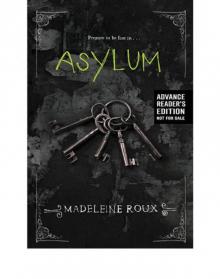 Asylum
Asylum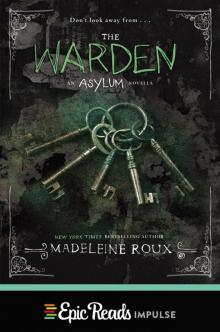 The Warden
The Warden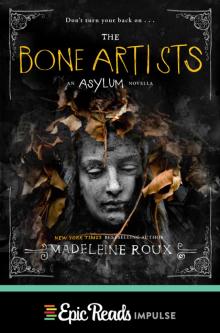 The Bone Artists
The Bone Artists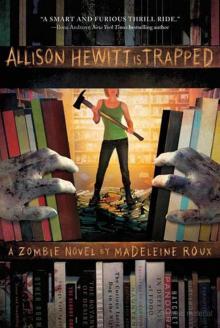 Allison Hewitt Is Trapped
Allison Hewitt Is Trapped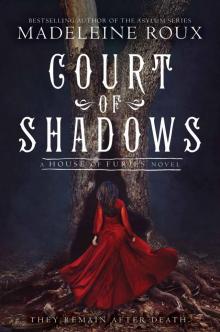 Court of Shadows
Court of Shadows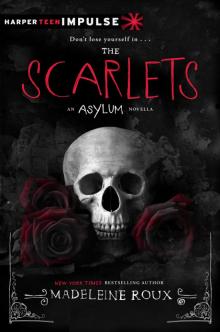 The Scarlets
The Scarlets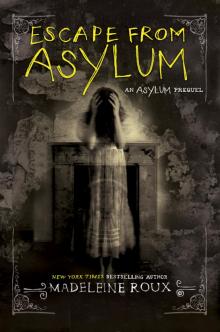 Escape From Asylum
Escape From Asylum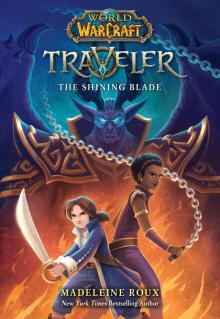 The Shining Blade
The Shining Blade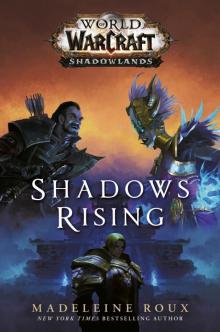 Shadows Rising (World of Warcraft: Shadowlands)
Shadows Rising (World of Warcraft: Shadowlands)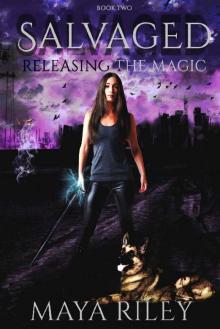 Salvaged
Salvaged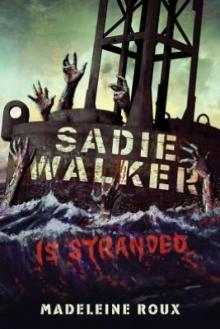 Sadie Walker Is Stranded
Sadie Walker Is Stranded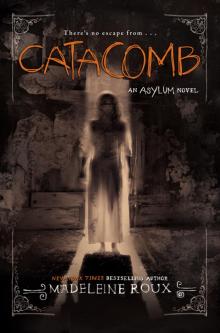 Catacomb
Catacomb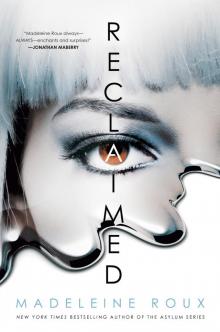 Reclaimed
Reclaimed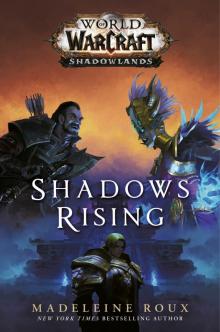 Shadows Rising (World of Warcraft
Shadows Rising (World of Warcraft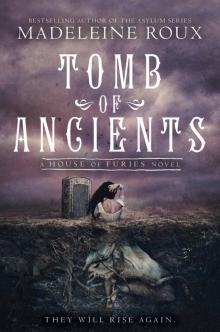 Tomb of Ancients
Tomb of Ancients